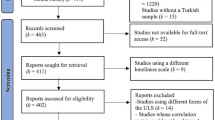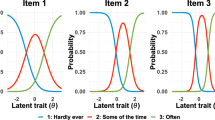Abstract
The authors of the University of California Los Angeles Loneliness Scale (UCLA-LS) have considered its structure to be unidimensional. Nevertheless, it has been repeatedly found that response direction can generate groupings of items. In this study, the multidimensional item response theory was applied to examine the psychometric properties of the Argentine version of the UCLA-LS. The participants were 556 residents of the Metropolitan Area of Buenos Aires, Argentina (55% female) with an average age of 43.8. The model fits of three models were compared: the unidimensional Graded Response Model (GRM), the multidimensional GRM, and the bifactor GRM. The results indicated that the bifactor GRM, which considered a general factor and two specific factors related to response direction, was the most adequate one. Loneliness, which was the general factor, explained 70.38% of the common variance. Direct response direction toward loneliness explained 20.09% of the common variance; in other words, it clearly biases item responses, whereas response direction toward companionship has a much lower impact (9.52%).
Similar content being viewed by others
References
Asparouhov, T., & Muthén, B. (2009). Exploratory structural equation modeling. Structural Equation Modeling, 16, 397–438. https://doi.org/10.1080/10705510903008204.
Auné, S., Abal, F., & Attorresi, H. (2017a). Effects of gender and education on happiness in argentinian adults. Liberabit, 23(2), 169–188. https://doi.org/10.24265/liberabit.2017.v23n2.02.
Auné, S., Abal, F., & Attorresi, H. (2017b). Argentine version of the happiness scale from Lima. Diversitas, 13(2), 201–214. https://doi.org/10.15332/s1794-9998.2017.0002.05.
Auné, S., Abal, F., & Attorresi, H. (2019). Construction and psychometric properties of the loneliness scale in adults. International Journal of Psychological Research, 12(2), 82–90. https://doi.org/10.21500/20112084.425782.
Benjamini, Y., & Hochberg, Y. (1995). Controlling the false discovery rate: A practical and powerful approach to multiple testing. Journal of the Royal Statistical Society, Series B, 57, 289–300.
Bjorner, J. B., Smith, K. J., Edelen, M. O., Stone, C., Thissen, D., & Sun, X. (2007). IRTFIT: A macro for item fit and local dependence tests under IRT models. Lincoln: QualityMetric Incorporated.
Bock, R. D., & Aitkin, M. (1981). Marginal maximum likelihood estimation of item parameters: An application of the EM algorithm. Psychometrika, 46, 443–459. https://doi.org/10.1007/bf02293801.
Boffo, M., Mannarini, S., & Munari, C. (2012). Exploratory structure equation modeling of the UCLA loneliness scale: A contribution to the Italian adaptation. Testing, Psychometrics, Methodology in Applied Psychology, 19(4), 345-363. 10.4473/TPM19.4.7.
Bradley, R. (1969). Measuring loneliness. Unpublished doctoral dissertation. Washington State University.
Cacioppo, J. T., & Cacioppo, S. (2014). Older adults reporting social isolation or loneliness show poorer cognitive function 4 years later. Evidence-Based Nursing, 75, 161–170. https://doi.org/10.1136/eb-2013-101379.
Cai, Y. (2015). The value of using test response data for content validity: An application of the bifactor-MIRT to a nursing knowledge test. Nurse Education Today, 35(12), 1181–1185. https://doi.org/10.1016/j.nedt.2015.05.014.
Cai, L., Thissen, D., & du Toit, S. (2011). IRTPRO user's guide. Lincolnwood: Scientific Software International.
Cappelleri, J. C., Lundy, J. J., & Hays, R. D. (2014). Overview of classical test theory and item response theory for the quantitative assessment of items in developing patient-reported outcomes measures. Clinical Therapeutics, 36(5), 648–662. https://doi.org/10.1016/j.clinthera.2014.04.006.
Chen, W., & Thissen, D. (1997). Local dependence indices for item pairs using item response theory. Journal of Educational and Behavioral Statistics, 22, 265–289. https://doi.org/10.3102/10769986022003265.
De Ayala, R. J. (2009). The theory and practice of item response theory. New York: Guilford Press.
De Jong Gierveld, J., & Kamphuis, F. (1985). The development of a Rasch-type loneliness scale. Applied Psychological Measurement, 9, 289–299. https://doi.org/10.1177/014662168500900307.
De Jong Gierveld, J. & van Tilburg, T. G. (1999). Manual of the loneliness scale. VU University Amsterdam, Department of Social Research Methodology.
De Jong Gierveld, J., van Tilburg, T. G., & Dykstra, P. A. (2016). Loneliness and social isolation. In A. Vangelisti & D. Perlman (Eds.), Cambridge handbook of personal relationships (pp. 485–500). Cambridge: Cambridge University Press.
DiTommaso, E., & Spinner, B. (1993). The development and initial validation of the social and emotional loneliness scale for adults (SELSA). Personality and Individual Differences, 14(1), 127–134. https://doi.org/10.1016/0191-8869(93)90182-3.
Gibbons, R. D., Bock, R. D., Hedeker, D., Weiss, D. J., Segawa, E., Bhaumik, D. K., Kupfer, E. F., Frank, E., Grochocinski, V. J., & Stover, A. (2007). Full-information item bifactor analysis of graded response data. Applied Psychological Measurement, 31(1), 4–19. https://doi.org/10.1177/0146621606289485.
Gow, A. J., Corley, J., Starr, J. M., & Deary, I. J. (2013). Which social network or support factors are associated with cognitive abilities in old age? Gerontology, 59(5), 454–463. https://doi.org/10.1159/000351265.
Haberman, S. J. (1978). Analysis of qualitative data: Vol. 1: Introductory topics. New York: Academic Press.
Hawkley, L. C., Preacher, K. J., & Cacioppo, J. T. (2010a). Loneliness impairs daytime functioning but not sleep duration. Health Psychology, 29(2), 124–129. https://doi.org/10.1037/a0018646.
Hawkley, L. C., Thisted, R. A., Masi, C. M., & Cacioppo, J. T. (2010b). Loneliness predicts increased blood pressure: Five-year cross-lagged analyses in middle-aged and older adults. Psychology and Aging, 25(1), 132–141. https://doi.org/10.1037/a0017805.
Holt-Lunstad, J., Smith, T. B., Baker, M., Harris, T., & Stephenson, D. (2015). Loneliness and social isolation as risk factors for mortality: A meta-analytic review. Perspectives on Psychological Science, 10(2), 227–237. https://doi.org/10.1177/1745691614568352.
Kurina, L. M., Knutson, K. L., Hawkley, L. C., Cacioppo, J. T., Lauderdale, D. S., & Ober, C. (2011). Loneliness is associated with sleep fragmentation in a communal society. Sleep, 34(11), 1519–1526. https://doi.org/10.5665/sleep.1390.
Luo, Y., Hawkley, L. C., Waite, L. J., & Cacioppo, J. T. (2012). Loneliness, health, and mortality in old age: A national longitudinal study. Social Science & Medicine, 74(6), 907–914. https://doi.org/10.1016/j.socscimed.2011.11.028.
Muraki, E., & Carlson, J. E. (1995). Full-information factor analysis for polytomous item responses. Applied Psychological Measurement, 19(1), 73–90. https://doi.org/10.1177/014662169501900109.
Orlando, M., & Thissen, D. (2000). Likelihood-based item fit indices for dichotomous item response theory models. Applied Psychological Measurement, 24, 50–64. https://doi.org/10.1177/01466216000241003.
Orlando, M., & Thissen, D. (2003). Further investigation of the performance of S-χ2: An item fit index for use with dichotomous item response theory models. Applied Psychological Measurement, 27, 289–298. https://doi.org/10.1177/0146621603027004004.
Perlman, D., & Peplau, L. A. (1981). Toward a social psychology of loneliness. In R. Gilmour & S. Duck (Eds.), Personal relationships 3: Personal relationships in disorder (pp. 31–43). London: Academic Press.
Quinn, H. O. (2014). Bifactor models, explained common variance (ECV) and the usefulness of scores from unidimensional item response theory analyses (Master’s thesis). NC: University of North Carolina at Chapel Hill.
Reise, S. P., Moore, T. M., & Haviland, M. G. (2010). Bifactor models and rotations: Exploring the extent to which multidimensional data yield univocal scale scores. Journal of Personality Assessment, 92(6), 544–559. https://doi.org/10.1080/00223891.2010.496477.
Russell, D. (1996). UCLA loneliness scale (version 3): Reliability, validity, and factor structure. Journal of Personality Assessment, 66(1), 20–40. https://doi.org/10.1207/s15327752jpa6601_2.
Russell, D., Peplau, L., & Cutrona, C. (1980). The revised UCLA loneliness scale: Concurrent and discriminant validity evidence. Journal of Personality and Social Psychology, 39(3), 472–480. https://doi.org/10.1037//0022-3514.39.3.472.
Russell, D., Peplau, L. A., & Ferguson, M. L. (1978). Developing a measure of loneliness. Journal of Personality Assessment, 42(3), 290–294. https://doi.org/10.1207/s15327752jpa4203_11.
Sacchi, C., & Richaud de Minzi, M. C. (1997). La Escala Revisada de Soledad de UCLA: Una adaptación argentina. Rev. Argent. Clín. Psicol, 6(1), 43–53.
Samejima, F. (1969). Estimation of latent ability using a response pattern of graded scores. Psychometrika monograph supplement, 17(4), 2. https://doi.org/10.1002/j.2333-8504.1968.tb00153.x.
Shevlin, M., Murphy, S., & Murphy, J. (2014). Adolescent loneliness and psychiatric morbidity in the general population: Identifying “at risk” groups using latent class analysis. Nordic Journal of Psychiatry, 68(8), 633–639. https://doi.org/10.3109/08039488.2014.907342.
Shevlin, M., Murphy, S., & Murphy, J. (2015). The latent structure of loneliness: Testing competing factor models of the UCLA loneliness scale in a large adolescent sample. Assessment, 22(2), 208–215. https://doi.org/10.1177/1073191114542596.
Stucky, B. D., & Edelen, M. O. (2015). Using hierarchical IRT models to create unidimensional measures from multidimensional data. In S. P. Reise & D. A. Revicki (Eds.), Handbook of item response theory modeling: Applications to typical performance assessment (pp. 183–206). New York: Routledge.
Stucky, B. D., Thissen, D., & Edelen, M. O. (2013). Using logistic approximations of marginal trace lines to develop short assessments. Applied Psychological Measurement, 37(1), 41–57. https://doi.org/10.1177/0146621612462759.
ten Berge, J. M., & Sočan, G. (2004). The greatest lower bound to the reliability of a test and the hypothesis of unidimensionality. Psychometrika, 69, 613–625.
Toland, M. D., Sulis, I., Giambona, F., Porcu, M., & Campbell, J. M. (2017). Introduction to bifactor polytomous item response theory analysis. Journal of School Psychology, 60, 41–63. https://doi.org/10.1016/j.jsp.2016.11.001.
van Orden, A., Witte, T. K., Cukrowicz, K. C., Braithwaite, S., Selby, E. A., & Joiner Jr., T. E. (2010). The interpersonal theory of suicide. Psychological Review, 117(2), 575–600. https://doi.org/10.1037/a0018697.
van der Weele, T. J., Hawkley, L. C., Thisted, R. A., & Cacioppo, J. T. (2011). A marginal structural model analysis for loneliness: Implications for intervention trials and clinical practice. Journal of Consulting and Clinical Psychology, 79(2), 225–235. https://doi.org/10.1037/a0022610.
Wilson, R. S., Krueger, K. R., Arnold, S. E., Schneider, J. A., Kelly, J. F., Barnes, L. L., et al. (2007). Loneliness and risk of Alzheimer’s disease. Archives of General Psychiatry, 64, 234. https://doi.org/10.1001/archpsyc.64.2.234.
Funding
The research was supported by UBACyT 2018 code 20020170100200BA and 20020170200001BA research grants from Faculty of Psychology, University of Buenos Aires and also National Agency for Scientific and Technological Promotion (ANPCyT) PICT-2017-3226.
Author information
Authors and Affiliations
Corresponding author
Ethics declarations
Conflict of Interest
On behalf of all authors, the corresponding author states that there is no conflict of interest.
Informed Consent
Informed consent was obtained from all individual participants included in the study.
Ethical Approval
All procedures performed in studies involving human participants were in accordance with the ethical standards of the institutional Responsible Behavior Committee Ref: 20020170100200BA and with the 1964 Helsinki declaration and its later amendments or comparable ethical standards.
Additional information
Publisher’s Note
Springer Nature remains neutral with regard to jurisdictional claims in published maps and institutional affiliations.
Electronic supplementary material
ESM 1
(XLSX 42 kb)
Annex
Annex
Rights and permissions
About this article
Cite this article
Auné, S.E., Abal, F.J.P. & Attorresi, H.F. Modeling of the UCLA Loneliness Scale According to the Multidimensional Item Response Theory. Curr Psychol 41, 1213–1220 (2022). https://doi.org/10.1007/s12144-020-00646-y
Published:
Issue Date:
DOI: https://doi.org/10.1007/s12144-020-00646-y




